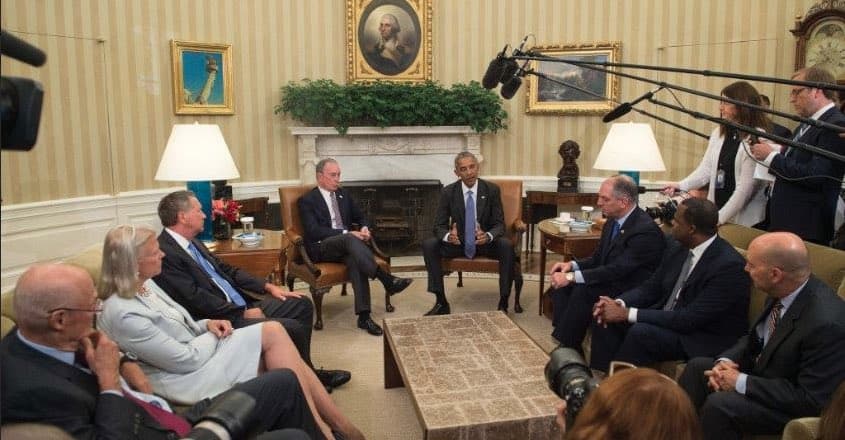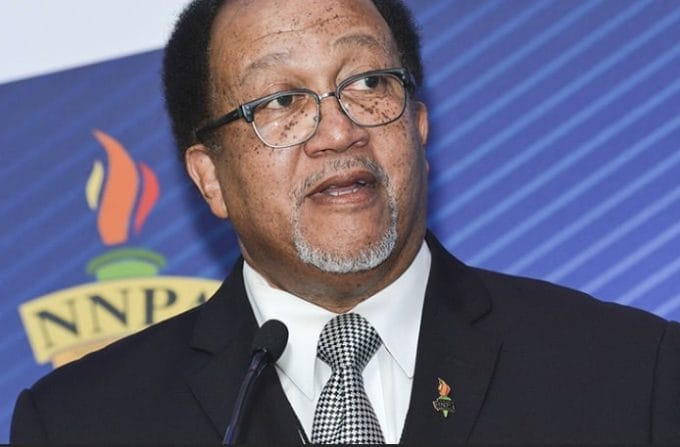By Hazel Trice Edney and Hamil Harris
(TriceEdneyWire.com) – Former New York City Mayor Mike Bloomberg has just made Black History. The presidential candidate who has been running his campaign through television ads and private meetings this week spent a historic amount of money with Black newspapers – $3.5 million.
“Of all the presidential candidates in the 2020 election, Mike Bloomberg just made the largest single political ad buy in the history of the NNPA,” said Dr. Ben Chavis, president/CEO of the National Newspaper Publishers Association (NNPA) in an interview with the Trice Edney News Wire. “The money has already been distributed and it’s running in our newspapers right now.”
Chavis says the money will be broken down among NNPA member newspapers in states that hold primaries on Super Tuesday and beyond. Super Tuesday states include Alabama, Arkansas, Colorado, Georgia, Massachusetts, Minnesota, Oklahoma, Tennessee, Texas, Vermont, and Virginia.
“It’s a national ad buy and over 129 of our newspapers will benefit from that,” Chavis said. “What it shows is that the Bloomberg campaign is taking the Black vote seriously and it’s taking the Black Press seriously.”
NNPA, which turns 80 in March, has a membership of more than 200 Black-owned newspapers around the country. A longstanding grievance aired by the organization is that Democratic candidates and the Democratic National Convention has tended to take Black newspapers and the Black voters who read them, for granted. This is despite the fact that African-Americans vote for Democratic presidential candidates 95 percent of the time.
While Chavis was clear that that NNPA does not endorse candidates, dollars spent in Black newspapers and with Black media are often seen as the sign of a candidate who is serious about Black issues.
“NNPA is a 501-C6; so we don’t endorse,” said Chavis. “But our member newspapers, they have the freedom to endorse whatever candidate they feel will best serve Black America. But I’d just like to note for Black history sake since this is Black History Month, that Mike Bloomberg just made Black history.”
Biden has long been thought to be the front runner in the Black community, especially because of his faithful service as vice president to President Barack Obama. But it is clear that Bloomberg’s strategy is to meet him head on. While Biden has yet to lay out a Black agenda, Bloomberg, on Jan. 19, held a meeting in Tulsa, Oklahoma to lay out his Black economic agenda.
Ron Busby, president/CEO of the U. S. Black Chambers Inc. confirmed that he attended that meeting at the invitation of the Bloomberg campaign.

“It did include an economic agenda for African-Americans. And it was very close to the U. S. Black Chambers’ economic agenda from increasing the number of Black-owned businesses to increasing the number of deposits into Black banks, increase the number of African American homeowners, increase the number of contracts awarded to Black businesses by the federal government – all issues pertaining to improving the economic agenda for Black people,” Busby recalled. “I think at the end of the day he is very open to improving conditions for Black people.”
Stressing that the USBC is a non-profit and cannot endorse candidates, Busby says he has had no such meeting with Biden. “Our plan is to meet with all of the candidates to discuss what they plan to do with Black folks.”
According to the Associated Press, at the Tulsa meeting, Bloomberg “spoke out against an American history of race-based economic inequality from slavery to segregation to redlining, and outlined a proposal aimed at increasing the number of black-owned homes and businesses. The plan includes a $70 billion investment in the nation’s most disadvantaged neighborhoods.”
With Iowa and New Hampshire, largely White states that are now all but in rear view, the political armies of the Democratic Party are racing from New Hampshire to Nevada and South Carolina and while Bernie Sanders and Pete Buttigieg are claiming front runner status, Bloomberg will not be on any ballot until Super Tuesday, March 3, when voters go to the polls in 12 states where nearly a quarter of the Democratic delegates will be selected.
But that didn’t stop Washington D.C. Mayor Muriel Bowser from endorsing the former New York City Mayor who has been depositing some of his billions in states across the country and showing up at African-American events that is eroding former Vice President Joe Bidens’ firewall of success.
“We can resolve our most pressing problems if we have the right leader to turn innovative ideas into reality,” Bowser said in a Jan 30th tweet. “Mike Bloomberg is a problem-solver with a proven track record of getting things done. He’s a mentor & friend & I’m proud to endorse him for President.”
The Democratic primary is an 11 candidate race with five other major contenders: Vermont Senator Bernie Sanders, former South Bend, Indiana Mayor Pete Buttigieg, Senator Elizabeth Warren and Vice President Joe Biden. Right now, there is no clear front runner.Initially Biden was counting on South Carolina, North Carolina and other southern states with large African-American voters to give him a much needed boost. But according to one key political observer that remains to be seen.
“Black voters are still shopping. I don’t go by the polls and when it comes to Black women we are very strategic,” said Melanie Campbell, president/CEO of the National Coalition on Black Civic Participation. “The country is in a challenging place. The whole idea of representative Democracy Is under threat.”
African-Americans continue to give Biden his advantage in North Carolina, where he is polling at 39 percent to 12 percent for Bloomberg and 10 percent for Sanders. But given Bloomberg’s aggressive strategy, this might not be enough.
During his speech in Tulsa, Bloomberg apologized for the controversial “stop and frisk” used by the NYPD while he was the mayor of New York City. Bloomberg went to Tulsa to commemorate the 1921 race riots in Tulsa where African-American business owners were killed and their shops burned in one of the worse race riots in US history.
“For hundreds of years, America systematically stole Black lives, Black freedom and Black labor,” Bloomberg told the audience. . “A theft of labor and a transfer of wealth – enshrined in law and enforced by violence.”
Bloomberg also unveiled his “Greenwood Initiative” that calls for: The creation of 1 million new Black homeowners in the next decade; the creation of 100,000 new Black-owned businesses in ten years; the investment of $70 billion in 100 of America’s most disadvantaged neighborhoods.
While former President Barack Obama has not endorsed any candidate, Bloomberg has launched an ad campaign promoting his connection with Obama that starts with a news clip featuring his words from 2013.
“At a time when Washington is divided in old ideological battles, he shows us what can be achieved when we bring people together to seek pragmatic solutions,” Obama says about Bloomberg in the 30-second political ad.
One of the challenges that each of the candidates have is generating excitement, according to E. Faye Williams, President of National Congress of Black Women.
“There is no excitement in the race and my concern is that people will stay home instead of going to the polls,” Williams said. “We had Senators Cory Booker and Kamala Harris but they are gone and right now we in the Black community feel left out.”



